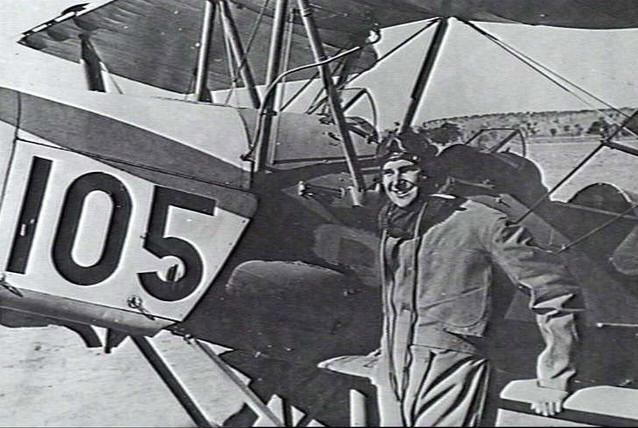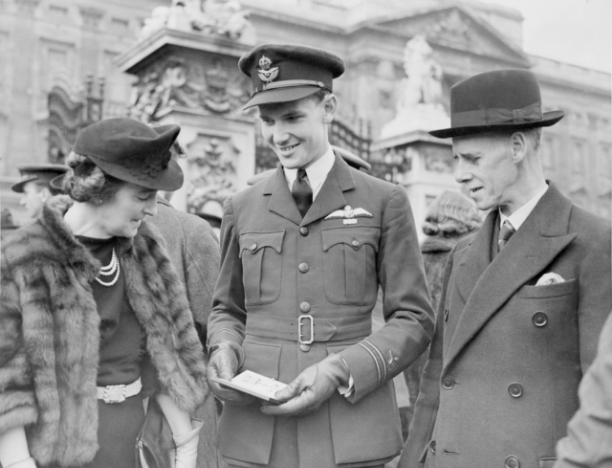 Standing
beside his aircraft is 403564 Leading Aircraftmans John Keith Douglas,
at No: 8 Elementary Flying Training School. He was killed near Munster,
Germany, after attacking the Dortmund-Ems Canal on 8th February 1945. He
was then a Wing Commander. Standing
beside his aircraft is 403564 Leading Aircraftmans John Keith Douglas,
at No: 8 Elementary Flying Training School. He was killed near Munster,
Germany, after attacking the Dortmund-Ems Canal on 8th February 1945. He
was then a Wing Commander.
John, born on 17th July 1921 in
Tamworth, New South Wales, was the son of Dr. Thomas and Marion Douglas,
of Manly, New South Wales.
He attended Knox Grammar School and
Scots College, and later became a salesman for David Jones.
Douglas enlisted in the Royal Australian Air Force in February 1941 at
the age of 19. He showed a great aptitude for flying in his training in
Australia and in Canada, where he was sent as a part of the Empire Air
Training Scheme. From Canada he went to the United Kingdom where he was
seconded to the Royal Air Force for service in Europe.
Douglas
was first posted to 103 Squadron, and flew 25 sorties over Europe in
Halifax and Lancaster bombers. He flew with great daring and skill. On
one occasion he was on a mine-laying operation in heavy cloud. Although
his blind flying instruments stopped working, he carried on and finished
the mission. On another occasion he was approaching his target over
Munich when his aircraft was attacked by an enemy night fighter. Douglas
skilfully manoeuvred his plane into a position which enabled his gunners
to destroy the fighter, after which he calmly flew over the target. For
these exploits he was awarded the Distinguished Flying Cross.
In
1944 he switched to flying Lancaster bombers and was posted to 460
Squadron for six operations over Europe. During his time here he was
awarded the Air Force Cross, and displayed quiet confidence and a keen
spirit. Douglas was a man who commanded respect. In October 1944 he was
promoted to Wing Commander and made one of the youngest(1)
squadron commanders in the Royal Australian Air Force with command of
467 Squadron. He flew a further seven successful operations over Europe
with his new Squadron in a Lancaster bomber.
On the 8th of
February 1945, Wing Commander Douglas and his crew flew a sortie against
the Dortmund-Ems Canal. Between ten and twenty minutes after leaving the
target, the Lancaster bomber gave a great lurch, and had probably been
hit by an enemy night fighter. Soon the port wing was on fire and
Douglas gave the order to bail out. Four of his crew jumped successfully
– three were made prisoners of war and one managed to escape capture and
got to England. Three of the crew, including Wing Commander John
Douglas, who was holding the plane steady so that the others could get
out, did not survive the accident. The bodies of Douglas, his bomb aimer
and his navigator were recovered by the Germans and buried. They now lie
in the Reichswald Forest War Cemetery. John Douglas was just 23 years
old.
 (Left)
John with his uncle and aunt, Dr Randolph(2) and Mrs Douglas, of Greenock,
outside Buckingham Palace after being decorated by King George VI (Left)
John with his uncle and aunt, Dr Randolph(2) and Mrs Douglas, of Greenock,
outside Buckingham Palace after being decorated by King George VI
The Sydney Morning Herald – Saturday, 21 April, 1945
"ROLL OF
HONOUR
DOUGLAS.—Aus. 403564, Wing-Commander John Keith Douglas,
D.F.C., A.F.C., R.A.A.F., previously posted missing, now officially
reported to have lost his life, result of operations over Germany,
February 7-8, 1945, dearly loved second son or Dr. and Mrs. T. S.
Douglas, Tamworth, and loved brother of Lindsay (ex R.A.A.F.), Ruth
(W.R.A.N.S.) and Norman, aged 23 years."
Note:
1.
Aged just 22, he became the youngest Australian squadron commander and
one of the youngest in Bomber Command.
2.
Possibly this man: Death: Douglas.-On March 31, 1951, at his home,
39, Greenock Road, Largs, Ayrshire, Archibald Randolph Fulton Douglas,
L.R.C.P.&S.Ed.. L.D.S.. D.D.S. Formerly of 5 Ardgowan St W, Greenock;
Lieut RAMC
Family history:
John Campbell Douglas and
Catherine, nee Fulton had at least 3 children, Randolph, John Campbell
(born Greenock in 1878) and Thomas S., all doctors.
Thomas
emigrated to Australia and practiced in Tamworth, New South Wales. In
1915, John Campbell Douglas , was 'On his way to Tamworth, N S Wales,
Australia to take charge of his son's practice, Dr Thomas S Douglas
while he goes to the front'. His son, John Campbell appears to have
travelled with him, and set up practice in Randwick, NSW, but he
was commissioned in October 1915 and embarked for the Middle east in the
same month.
In March 1916, John Campbell Jr was posted to Tel el
Kebir and then transferred to 4 Field Ambulance in April. A year later,
in May 1917, after enduring a winter on the Somme, and the first battle
of Bullecourt, Douglas was posted briefly to 4 Div Train, and then
returned to England. He worked for a short period at 1 AAH at Harefield
while waiting for a ship, and sailed for Australia in July 1917. Douglas
pursued a career in ophthalmology, and established a specialist practice
at Ballarat, Victoria. He was an honourary surgeon at the Ballarat base
Hospital til 1941. He died in 1959.
John Campbell Douglas's
(both) departure for Australia was reported by Jenny F S Douglas,
whose relationship with them is unknown.
Randolph had an elder
daughter, Betty, who married Surgeon Lieutenant (D.) George Philip,
R.N., only son of Mr. and Mrs. L. G. Wallis, Brockhurst Road, Birmingham
(Engagement announced 9 Jan 1941).
|


